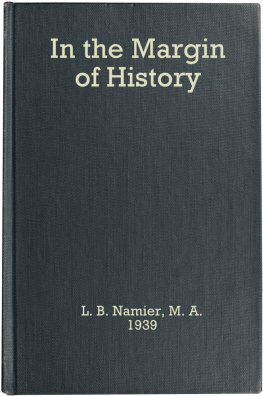Lewis B. Namier - In the Margin of History (Essay index reprint series)
Here you can read online Lewis B. Namier - In the Margin of History (Essay index reprint series) full text of the book (entire story) in english for free. Download pdf and epub, get meaning, cover and reviews about this ebook. year: 1939, publisher: Ayer Co Pub, genre: Politics. Description of the work, (preface) as well as reviews are available. Best literature library LitArk.com created for fans of good reading and offers a wide selection of genres:
Romance novel
Science fiction
Adventure
Detective
Science
History
Home and family
Prose
Art
Politics
Computer
Non-fiction
Religion
Business
Children
Humor
Choose a favorite category and find really read worthwhile books. Enjoy immersion in the world of imagination, feel the emotions of the characters or learn something new for yourself, make an fascinating discovery.
- Book:In the Margin of History (Essay index reprint series)
- Author:
- Publisher:Ayer Co Pub
- Genre:
- Year:1939
- Rating:4 / 5
- Favourites:Add to favourites
- Your mark:
- 80
- 1
- 2
- 3
- 4
- 5
In the Margin of History (Essay index reprint series): summary, description and annotation
We offer to read an annotation, description, summary or preface (depends on what the author of the book "In the Margin of History (Essay index reprint series)" wrote himself). If you haven't found the necessary information about the book — write in the comments, we will try to find it.
In the Margin of History (Essay index reprint series) — read online for free the complete book (whole text) full work
Below is the text of the book, divided by pages. System saving the place of the last page read, allows you to conveniently read the book "In the Margin of History (Essay index reprint series)" online for free, without having to search again every time where you left off. Put a bookmark, and you can go to the page where you finished reading at any time.
Font size:
Interval:
Bookmark:
* A Distributed Proofreaders Canada eBook *
This ebook is made available at no cost and with very fewrestrictions. These restrictions apply only if (1) you makea change in the ebook (other than alteration for differentdisplay devices), or (2) you are making commercial use ofthe ebook. If either of these conditions applies, pleasecontact a FP administrator before proceeding.
This work is in the Canadian public domain, but may be undercopyright in some countries. If you live outside Canada, check yourcountry's copyright laws. IF THE BOOK IS UNDER COPYRIGHTIN YOUR COUNTRY, DO NOT DOWNLOAD OR REDISTRIBUTE THIS FILE.
Title: In the Margin of History
Date of first publication: 1939
Author: L. B. Namier, M.A. (1888-1960)
Date first posted: Oct. 16, 2014
Date last updated: Oct. 16, 2014
Faded Page eBook #201410D9
This ebook was produced by: Barbara Watson, Mark Akrigg, Alex White& the online Distributed Proofreaders Canada team at http://www.pgdpcanada.net
IN THE
MARGIN OF HISTORY
BY
L. B. NAMIER, M.A.
Professor of Modern History in the University of Manchester
MACMILLAN AND CO., LIMITED
ST. MARTINS STREET, LONDON
1939
COPYRIGHT
PRINTED IN GREAT BRITAIN
BY R. & R. CLARK, LIMITED, EDINBURGH
Most of the essays in this book have beenprinted before, and are now republished with aminimum of change; in the case of the politicalessays their original dates should therefore benoted.
My best thanks are due to the editors, owners,and publishers for permission to reproduce theessays; to those of Palestine and Middle Eastfor the diagram on the Palestine VanishingTrick; to Sir Max Beerbohm for the cartoonof Count Berchtold and to Mr. SiegfriedSassoon who owns it; and to Flight-LieutenantR. G. Sims, R.A.F., for the photograph ofT. E. Lawrence.
L. B. NAMIER
15 Gloucester Walk
London , W.8
June 1, 1939
FOREIGN AFFAIRS
JUDAICA
UNDER THE GEORGES
NAPOLEON
MEN WHO FLOUNDERED INTO THE WAR
T. E. LAWRENCE
There would be little to say about Diplomacy,Secret and Open, were it not for the nonsensewhich is talked about it. Diplomacy is theorganized system of negotiations between sovereignStates, and in its nature and methods doesnot differ essentially from other kinds of negotiations.As Lord Hervey wrote, two centuries ago,the transactions between men, great and small, are
still the same game, and played with thesame cards, the disparity in the skill ofgamesters in each equally great ... theonly difference is their playing more orless deep, whilst the cutting and shuffling,the dealing and the playing, is still thesame whether the stakes be halfpence ormillions.
But games are not played with open cards, andnegotiations, whether between States, businessfirms or individuals, can seldom, if ever, be conductedin public.
At the root of most of the nonsensetalked about secret diplomacy lies confusionbetween aims and methods, between policyand negotiations. The vital distinction betweenthe two is stressed by Mr. Harold Nicolson,one of the most articulate experts and best-informedwriters on diplomacy. Policy should besubjected to democratic control: the execution ofthat policy should be left to trained experts.Policy should never be, and need never be,secret; but the conduct of negotiations must beconfidential. In other words, what the public hasa right to know is the general trend of nationalpolicy and any binding commitments incurred inits name; while the decision as to the amountof information to be given out about negotiations,and the choice of time for doing so, must be leftto those entrusted with their conduct.
Publicity destroys the freedom of negotiations.Every word said in public is apt to commit thenegotiator. This makes him over-cautious andleaves little scope for tentative proposals. Couldeven a non-political treaty e.g. a commercialagreementbe discussed in public? At everyturn vested interests would be created whichwould hamper the further course of the negotiations.Still worse where frontiers are concerned:that between the Irish Free State and Ulsteradmits of obvious improvements; but all thoughtof such amendments, which could have been madeon a basis of give and take, had to be droppedbecause of the vested interests created by the treatyonce it was published. Those included in the Statein which they wish to be, even if less numerous,have a moral superiority in asserting the statusquo over those who would profit by a change.
In fact, premature publication, or exposure,is a well-known method of interfering with negotiations.When in the spring of 1919 an inter-AlliedCommittee suggested a frontier which would havesatisfied very nearly the maximum of Polish territorialclaims against Germany, their secret reportspeedily found its way into the French Press, itbeing hoped by those who committed the indiscretionthat the intense anti-German feeling in Alliedcountries would henceforth preclude any materialchange in the proposed frontier. There was agreat deal to be said for that frontier which gaveDanzig to the Poles, but not for the attempt toput pressure on what ought to have been a quasi-judicialbody, considering territorial claims in thelight of certain acknowledged principles; andthe attempts of decent negotiators to find justsolutions are seldom helped by public discussionand agitation. The fruit will be poor if prematurelyplucked by incompetent and irresponsiblehands, and orchards therefore require a reasonablemeasure of protection and seclusion.
There is a further, very important, reason whydiplomatic negotiations must be conducted insecret. Most nations are extremely touchy.National honour and national prestigewere a fetish in this country in the eighteenthcentury, and are still on the European Continent;and the less honour nations observe in practice,the more sensitive are they to anything whichmight seem to question what amount of it theypossess. The British and French Governmentsmust have repeatedly charged the Italians withbreach of faith in the matter of non-interventionin Spain, even before Mussolini proudly proclaimedit to the world, and must have hinted atwhat everyone knew about the nationality of thepirate submarines in the Mediterranean. But anysuch public pronouncement originating from ourside would have rendered further negotiationsimpossible.
Altogether, the veil thrown over a great deal ofdiplomatic transactions, in so far as this countryis concerned, often serves the purpose of hidingfrom the British public the bad manners andunreasonable nature of foreign Governments; inother words, it serves the interest of peace. Otherwisedamage is apt to occur. The Kruger telegram,which was a public act, is a case in point.It did serious and lasting harm to Anglo-Germanrelations and weighed heavily with public opinionin this country. But in diplomatic intercoursewith the Germans such incidents are by no meansrare. What reception would the Kaiser have receivedfrom the British public in 1899 had theyknown that he had refused to accept the invitationof his grandmother unless the British Governmentfirst gave way to his petulant and unreasonabledemands arising out of some obscure squabbles inSamoa? Again, had every step in the negotiationsfor a limitation of naval armaments beendisclosed to the British public, Sir EdwardGreys policy would have been fully justified intheir eyes, but further talks would have becomeimpossible.
Generally speaking, the public and the Pressare much more inflammable than professionaldiplomats, or even Cabinet Ministers, who haveto consider the consequences of blowing offsteam. Mr. J. A. Spender, an unimpeachablewitness, thus describes the position during theyears preceding the Great War:
Next pageFont size:
Interval:
Bookmark:
Similar books «In the Margin of History (Essay index reprint series)»
Look at similar books to In the Margin of History (Essay index reprint series). We have selected literature similar in name and meaning in the hope of providing readers with more options to find new, interesting, not yet read works.
Discussion, reviews of the book In the Margin of History (Essay index reprint series) and just readers' own opinions. Leave your comments, write what you think about the work, its meaning or the main characters. Specify what exactly you liked and what you didn't like, and why you think so.










